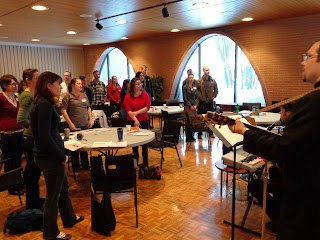 |
| Photo:www.st-takla.org |
A couple of weeks ago, I started to read some of the homilies by Gianfranco Cardinal Ravasi, President of the Pontifical Council for Culture. I have thoroughly enjoyed his vision and understanding of the importance of culture and communication for the mission of the Church, specially pertaining to the new evangelization. He sees culture as something that unites people as well as an encounter with the Word of God which leads to communion, solidarity and dialogue.
In his writings and tweets (@CardRavasi_en), he often refers to our mission as coming from our baptismal promises – our Easter promises. He states that we must integrate our Christian identity into all of life. That identity has authenticity in Christ. We are baptized into Christ, and through baptism we enter into his threefold office: We are called to share in his priestly, prophetic and kingly office (CCC 897).











